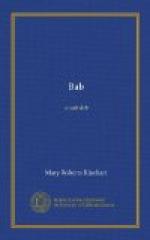Mother put her hands to her Face, and emited a low, despairing cry.
“Come,” Leila said to her, as to a troubled child. “Come, and Hannah can use the vibrater on your spine.”
So she went, but before she left she said:
“Barbara, if you will only promise to be a good girl, and give us a chance to live this Scandle down, I will give you anything you ask for.”
“Mother!” Sis said, in an angry tone.
“What can I do, Leila?” mother said. “The girl is atractive, and probably men will always be following her and making trouble. Think of last Winter. I know it is Bribery, but it is better than Scandle.”
“I want nothing, mother,” I said, in a low, heartstricken tone, “save to be allowed to live my own life and to have a Career.”
“My Heavens,” mother said, “if I hear that word again, I’ll go crazy.”
So she went away, and Sis came over and looked down at me.
“Well!” she said. “What’s happened anyhow? Of course you’ve been up to some Mischeif, but I don’t suppose anybody will ever know the Truth of it. I was hopeing you’d make it this time and get married, and stop worrying us.”
“Go away, please, and let me Sleep,” I said. “As to getting married, under no circumstances did I expect to marry him. He has a Wife already. Personally, I think she’s a totle loss. She wears patent wavers at night, and sleeps with her Mouth open. But who am I to interfere with the marriage bond? I never have and never will.”
But Sis only gave me a wild look and went away.
This, dear readers and schoolmates, is the true story of my meeting with and parting from Reginald Beecher, the playwright. Whatever the papers may say, it is not true, except the Fact that he was recognized by Jane Raleigh, who knew the suit he wore, when in the act of pawning his ring to get money to escape from his captors (I. E., The Pattens) with. It was the necktie which struck her first, and also his gilty expression. As I was missing by that time, Jane put two and two together and made an Elopement.
Sometimes I sit and think things over, my fingers wandering “over the ivory keys” of the typewriter they gave me to promise not to elope with anybody—although such a thing is far from my mind—and the World seems a cruel and unjust place, especialy to those with ambition.
For Reginald Beecher is no longer my ideal, my Night of the pen. I will tell about that in a few words.
Jane Raleigh and I went to a matinee late in September before returning to our institutions of learning. Jane cluched my arm as we looked at our programs and pointed to something.
How my heart beat! For whatever had come between us, I was still loyal to him.
This was a new play by him!
“Ah,” my heart seemed to say, “now again you will hear his dear words, although spoken by alien mouths.
“The love seens——”




